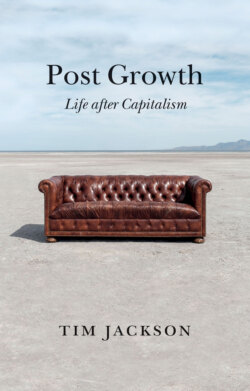Читать книгу Post Growth - Tim Jackson - Страница 21
Fargonomics
ОглавлениеAnother common suspect is the economic shift that took place in the 1980s. The economics of ‘monetarism’ heralded a radical agenda of privatization and deregulation. Today’s predominantly neoliberal, free market policies stem from that time. They had a profound impact on society. It’s since that time in particular that inequality has risen, debt has expanded, anxiety and suicide rates have multiplied, obesity and lifestyle disease have accelerated.
‘In America, the emblematic core of capitalism, half of the 1980 generation are absolutely worse off than the generation of their parents at the same age,’ reveals Collier. In the intervening decades, capitalism has ‘continued to deliver for some, but has passed others by’.14
That’s a kind interpretation. Less kind is Noah Hawley’s black-comedy crime series Fargo. In the second season of the show, set in 1979, a local family in Fargo, North Dakota, goes head to head with the infamous Kansas City Crime Family and comes off worse in the conflict. In the final episode of the season, one of the Kansas gangsters, Mike Mulligan (played by Bokeem Woodbine), arrives at the syndicate’s headquarters expecting promotion for his part in the downfall of the Fargo family. He’s shown to his new office in an unremarkable building and told by his manager that he’ll be ‘working closely with the accounting department, looking for ways to optimize revenue.’ Mike is mystified. ‘This is the future,’ his manager explains. ‘The sooner you realize there’s only one business left in the world – the money business, just ones and zeros – the better off you’re gonna be.’
Hawley’s message is clear, right down to the time the story took place: 1979. It was the year that Ronald Reagan announced his Presidential campaign and Margaret Thatcher came to power in the UK. Monetarism announced an era in which, as the Chicago School economist Milton Friedman infamously declared: the business of business is business. Social responsibility was irrelevant. The ethics of the city became virtually indistinguishable from those of organized crime. Charles Ferguson’s 2010 documentary Inside Job and Adam McKay’s 2015 comedy-drama The Big Short – two films about the financial crisis – make the same point.15
It would all have appalled Adam Smith – the founding father of capitalism. But he wouldn’t have been remotely surprised. He knew only too well that self-interest left unchecked undermines the benefits of the market. He once railed deliciously against ‘an order of men whose interest is never exactly the same with that of the public, who have generally an interest to deceive and even to oppress the public, and who accordingly have, upon many occasions, both deceived and oppressed it’. The target of his attack was ‘those who live by profit’ – or in other words, capitalists themselves.16
Only the state could counter the dangers of runaway self-interest, Smith realized. Neoliberalism’s fantastic conceit was to neglect this advice completely. Instead, it argued, capital should be freed from government to the greatest extent possible. What ensued was a philosophical abomination. It had nothing to do with the ‘freedom’ of the market and no credibility in either theory or practice. Yet over the last two decades of the twentieth century its ideas became deeply influential across the world. It is quite simply Fargonomics. Its ethics are gangster ethics, the law of the jungle. And it’s created a form of capitalism that has worked exceptionally well for the few but continues to fail for the many.
The voices in Davos reflect a rising awareness of this failure. The assailant was known to us, they seem to imply. We made a mistake in trusting him. We understand now the lesson that Smith tried to teach us. We must reverse the damaging policies of the past and make capitalism work for everyone. Profit with purpose in Benioff’s view. A strengthening of ‘reciprocal obligations’ in Collier’s book.
These proposals are clearly important. Revolutionary even, by recent standards. They represent a call for a return to capitalism’s ‘golden age’ – the immediate post-war period – where business was kinder, inequality was lower and the concept of social welfare mattered. But as the Financial Times columnist Martin Wolf has pointed out, things aren’t that simple. Conditions have changed. ‘The egalitarian western societies of the 1950s and 1960s had a global monopoly of industry and a social solidarity bred by shared adversity,’ he wrote. ‘That past is a foreign country. It can never be revisited.’17
It’s a salutary reminder that we cannot rewind history. But perhaps, as Maya Angelou suggested, we can still learn some of its lessons. If neoliberalism was the assailant, why was it allowed to wander free over so many decades, inflicting its pain across society? Why was the damage condoned for so long? What convinced us to buy this misreading of Smith’s vision of the market in the first place?
